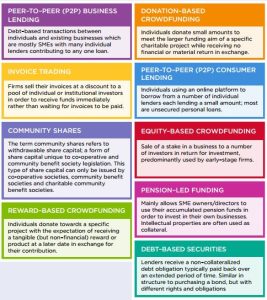The alternative finance market in the UK is expected to exceed £2 billion of funding provision by the end of 2016. Alternative finance covers a variety of new financing models that have emerged outside of the traditional financial system, that connect fundraisers directly with funders often via online platforms or websites.
What do we mean by Alternative Finance?
Alternative finance is an umbrella term that covers a range of very different models from people lending money to each other or to businesses, to people donating to community projects and businesses trading their invoices. The distinctions between these models are important as they differ enormously in the types of people and organisations that use them, why they use them and the nature, form and amount of financial transactions that take place. Below, we try to give an understanding of each platform and their use:

Different motivations driving usage of alternative finance
The motives behind fundraisers turning to alternative sources of finance also vary depending on the model.
Those who fundraised through donation and reward–based crowdfunding valued most having more control over their projects.
In contrast, P2P business lending borrowers and entrepreneurs that had fundraised via equity–based crowdfunding valued the speed at which they could access funding and how easy the platform was to use.
For P2P consumer borrowers the primary motive was securing a more favourable interest rate as well as a higher quality of customer service.
Those trading invoices through alternative finance platforms did so largely to source working capital; whilst those utilising pension–led finance valued the ability to invest their own pension into their businesses.
In a similar vein, the motivations for funding also differed significantly across the industry.
Those in P2P lending and equity–based crowdfunding were primarily driven by the prospect of financial returns with less concern for backing local businesses or supporting social causes.
In contrast those in reward and donation–based crowdfunding were highly motivated by fundraisers’ ideas and the potential to make a positive difference with their money.
For instance, the prospect of obtaining financial return was ‘important’ or ‘very important’ to 82% of P2P business lenders and to 96% of investors in equity–based crowdfunding, whereas this was only ‘important’ or ‘very important’ to 24% of people who bought community shares.
Survey responses from users of donation–based crowdfunding highlight how only 22% of people have funded one or more projects that they would benefit from themselves, whereas 46% have funded projects that others in or outside their local area could use.
The socio–economic impact of alternative finance
By December of 2014, the UK alternative finance market had provided working, growth and expansion capital to an estimated 8,000 SMEs as well as crucial funding for hundreds of community and voluntary organisations across the country. Presently, over 100,000 people will have acquired personal loans from P2P consumer lending platforms, of which many are sole–traders borrowing money for business purposes. The importance of the alternative finance market was also highlighted in the surveys of users of alternative finance platforms, where many fundraisers stated that they would have struggled to source funds otherwise.
This is particularly true in donation–based crowdfunding where 64% of those who raised money say it is ‘unlikely’ or ‘very unlikely’ they would have been able to access the funds they need if they could not have turned to alternative finance.
53% of those using reward–based crowdfunding thought it was ‘unlikely’ or ‘very unlikely’ that they would have been able to get funding elsewhere.
Impact on business growth
Since successfully raising finance, individuals and businesses have seen a variety of positive impacts:
75% of those that received funding through reward or equity–based crowdfunding launched a new product or service after funding rounds.
70% of SME borrowers of P2P business lending have seen their turnover grow since secured funding with 63% of them recording a growth in profit.
Over 30% of those who raised funds via P2P business lending or invoice trading, reported that they would have been ‘unlikely’ or ‘very unlikely’ to get funding elsewhere.
79% of businesses had attempted to get a bank loan before turning to P2P business lending, with only 22% being offered finance.
Increasing philanthropic giving and volunteering
Alternative finance models also facilitate significant giving to good causes predominantly through the reward, community shares and donation–based models as well as to renewable energy ventures through debt–based securities.
For donations and reward–based crowdfunding just 23% and 21% stated the money they donated or pledged would otherwise be used for charitable giving, indicating that alternative finance is providing significant additional giving to social good projects.
As well as the funds provided, crowdfunding is helping increase volunteering and social action:
Results show that 29% of backers on donation–based crowdfunding platforms had also given advice and feedback to campaigns and 27% had offered to help or volunteer with the project.
Correspondingly, 34% of fundraisers have seen an increase in volunteerism after they fundraised through donation–based crowdfunding.
